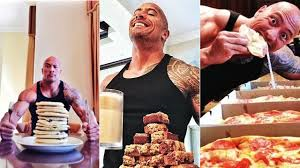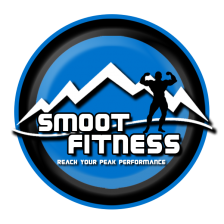Whether or not you should track your food intake is a highly debated topic. Some people allow their body to regulate when and how much they eat, while others think this is an absurd idea that will turn them in to an obese giraffe within a matter of weeks (yes, there is a pic of an obese giraffe on the internet – no, I’m not sure if it’s real – yes, it’s pretty freakin funny!).
In my opinion, you can definitely get lean without tracking macros, but I think you’ll make the process a whole lot easier if you’re using some form of measurement (counting calories). But hey, that’s me, and I’ve listed a few questions below for you to ask yourself when trying to determine which method is right for YOU. Remember, there’s no “right” or “wrong.” There is simply “optimal” in respect to your unique situation.
1.) Do You Want to Compete in Bodybuilding?
There is a major difference between being lean, and being “stage ready.” Most men can see their abs at about 10-12 percent body fat (women a little bit higher), and getting down to these levels is not that complex of a process. Add more nutrient dense foods to your diet, progressively lower your portion size, eat slower, and start doing a bit more activity. You’ll have abs in a relatively short amount of time.
But prepping for a bodybuilding show is a different animal. The norm is to be about 4-5 percent body fat (not something you would want to maintain for any real length of time), and I firmly believe that you need to track your food intake to get there.
Any of the top contest prep coaches ( Layne Norton, Alberto Nunez, Eric Helms) will tell you, dropping from 10 percent body fat takes your body out of its comfort zone, but going from 10 to 5 percent makes it go WHAT THE F***?
The process isn’t linear (far from it), adjustments need to be made on a weekly basis (sometimes more than that), and trying to guess your way to shredded glutes and veiny abs is, in my opinion, a recipe for physical and psychological disaster. If you’re just trying to get lean, you don’t really need to worry about tracking your food intake. If you’re considering stepping on stage, you should have had myfitnesspal downloaded months ago!
2.) Do You Have Good Portion Control?
It may seem silly, but whether or not you have good portion control has a major impact on whether or not you should track your food intake. In my experience, people fall in to one of two categories:
– Those that have very good portion control and stop eating when they’re full.
– Those that have very bad portion control and end up gorging themselves in to oblivion.
 I kind of fall in the middle – my portion control isn’t the best, but I’m not one of those guys that habitually eats himself in to a food coma (anymore!). However, tracking macros is still a must for me if I want to lose body fat because fat loss is dependent upon your ability to consistently be in a caloric deficit (burn more energy than you are taking in).
I kind of fall in the middle – my portion control isn’t the best, but I’m not one of those guys that habitually eats himself in to a food coma (anymore!). However, tracking macros is still a must for me if I want to lose body fat because fat loss is dependent upon your ability to consistently be in a caloric deficit (burn more energy than you are taking in).
For those of you that have great portion control and can literally “feel” when they’ve eaten too little, just enough, or too much, keep doing your thing. If you’re like me and have a ravenous appetite with no real “off” switch, track your macros. Not doing so will just have you spinning your wheels and fighting simply to not GAIN body fat.
3.) Are You Willing to Eat Almost Nothing but Nutrient Dense Foods?
If you don’t track your food intake, you are going to have to steer clear of processed and less nutrient dense food options. Not because they’re inherently bad or lead to more fat gain than their “healthier” counterparts (they DON’T), but because they contain more calories in a smaller serving size, and therefore are much easier to overeat.
Let me give you an example. One Krispy Kreme donut is about 250 calories (I’m not using Dunkin because quite frankly, Dunkin sucks!). That is about the equivalent of two large bowls of oatmeal (the oats will have more carbs and the donut will have more fats, but at the end of the day, the calories will balance out). Which one is going to provide more nutrients and keep you satiated? Obviously it’s the two bowls of oatmeal.
Eating that donut will taste good for the whopping five seconds that it’s in your mouth, but then it’s gone. By the ten second mark, you’ll feel like you haven’t had a meal in a week. By the fifteen second mark, you’re already on donut number four. And then five. And then six. And you keep eating until you finally get that feeling that you’re full and satisfied. Which is probably after about 10 donuts (it is for me anyway), and about 2,500 calories.
To put this in perspective, 2500 calories is enough for most people to MAITAIN their bodyweight, and you’ve just knocked that down in the first meal of the day. Deficit blown! And hey, you have another 10-12 hours left in the day, and I can almost guarantee that you’re not planning to fast for that entire length of time. So you eat more (there’s always tomorrow right?), probably gain a bit of weight, and the cycle just repeats itself the next day.
This is why I think flexible dieting and tracking macros is the best way to go about losing body fat. Because if you track your food intake, you learn what a proper serving size is, how to adjust portion sizes to fit your goals, how to balance the foods you need and the foods you want, and your adherence and overall results go through the roof.
4.) Will You Actually Track Macros/Calories?
The final area I want to touch on is mental state. You’ll probably think I’m a hypocrite (and to be perfectly honest, I am), but I can’t stand tracking macros. It could be because I became obsessed with tracking macros in the past, because it makes me feel like I’m always tied down to a set of numbers, or because I simply DON’T LIKE DOING IT.
Whatever the case may be, that’s me, it’s definitely something I need to get over and work on, but it’s also something that has taught me that not everyone is cut out to track their food intake. Or to strength train. Or to do conditioning work. Or to spend an entire Saturday watching Dragon Ball Z marathons (don’t judge me, that show is AWESOME).
If tracking your food stresses you out and isn’t something you can maintain for long periods of time, than don’t do it. Remember, the most optimal plan on paper won’t work if you don’t follow it. I do think it’s a good idea to track periodically throughout the year in order to get a good understanding of your current food intake, and the nutrient profiles of the foods you eat on a regular basis, but if tracking long term isn’t for you, find another option. You will be much more successful finding a plan that works around your lifestyle instead of trying to fit your lifestyle around your nutrition plan.
Summing Up:
I want to leave you with a quote from Nutritional Coach Sohee Lee (I’m pretty sure I’ve used this quote before), “if you can’t see yourself maintaining your diet one month, one year, or five years down the road, something needs to change.” Both tracking and not tracking your food intake have their benefits, and you really just have to experiment with each and figure out what works best for you.
If you’re seeing good results from tracking macros, keep doing it. If counting calories is too stressful and you have good portion control, go with your gut (ha, you see what I did there?). Either way, as long as your program is in line with your goals, it’s flexible, and you’re staying consistent, you will eventually reach your goals.
Contact Nick:
Twitter-SmootFit
Facebook-Smoot Fitness
Like What You See?
Get the Smoot Fitness Guide to Getting Stronger - FREE.



Leave a Reply